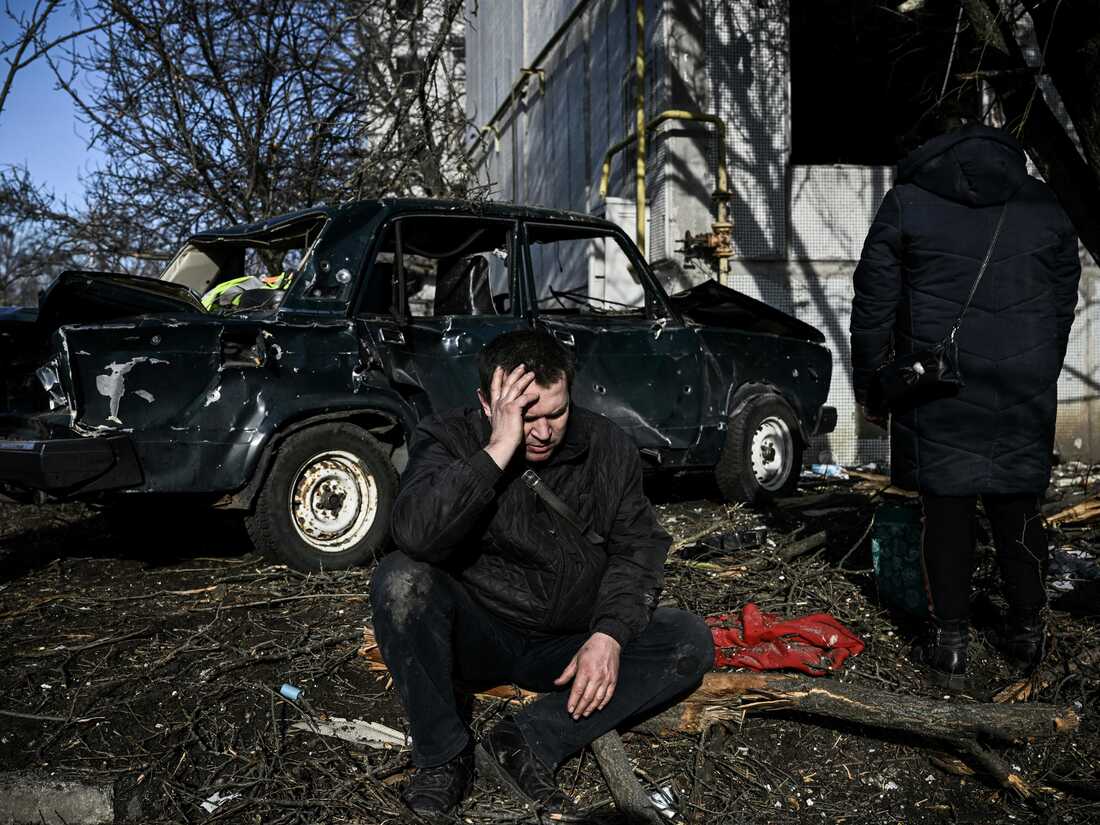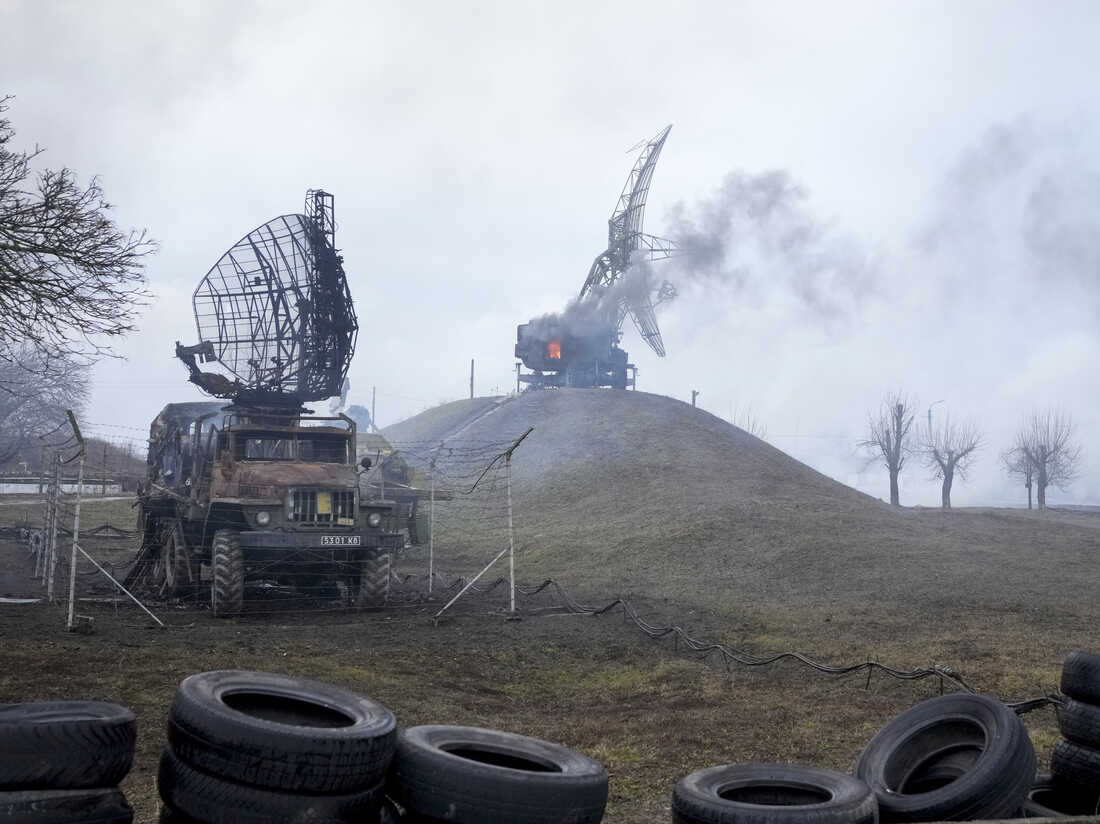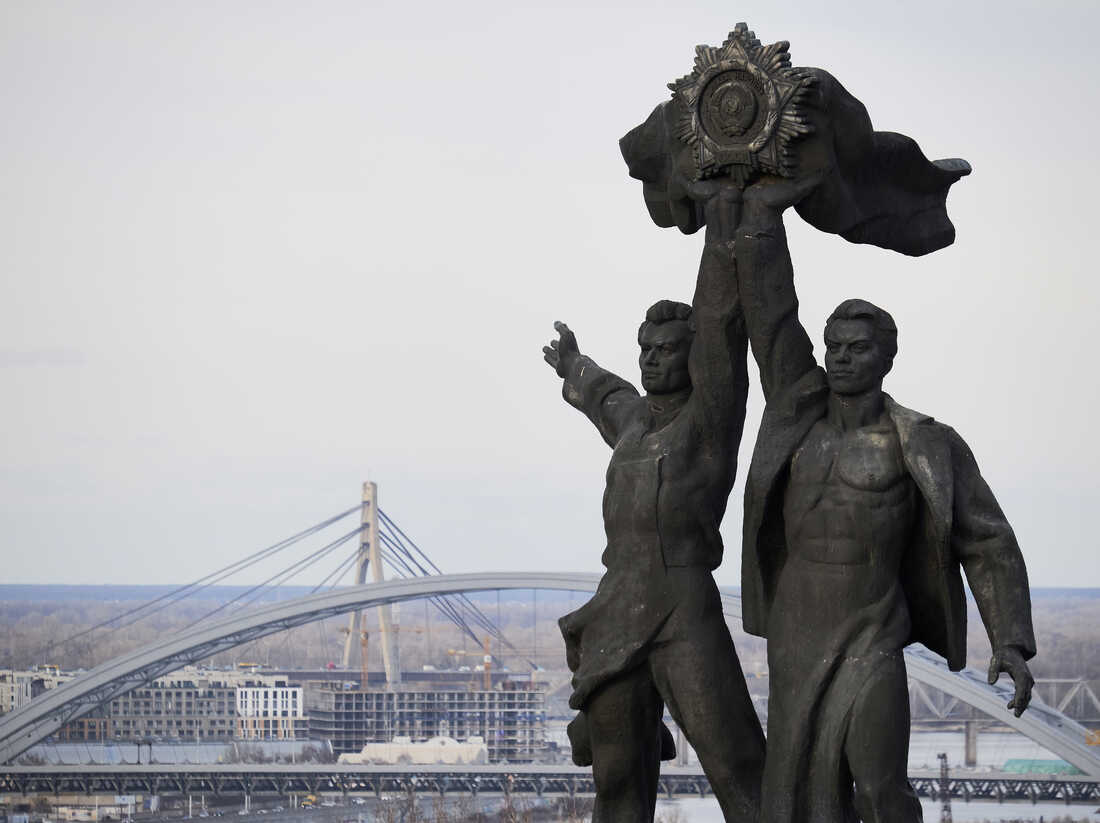A man sits outside his destroyed building following bombings that hit the eastern Ukraine town of Chuhuiv on Thursday as Russian armed forces are trying to invade Ukraine from several directions, the border guard service said.
As Russian military forces and Russian-backed separatists continued striking targets across Ukraine on Thursday, Ukrainian President Volodymyr Zelenskyy called on the public to remain calm while declaring martial law.
Missile strikes and military barrages struck Ukrainian targets from the country's northern, eastern and southern borders.
The strikes drew quick international condemnation of Russia, from capitals across Europe to Asia. The invasion also shook financial markets around the world; global oil and gold prices soared, U.S. stocks tumbled and indices across Asia recorded significant losses while European markets opened with a downward reaction.
Zelenskyy said in his morning public address that he had been in touch with U.S. President Biden following the Russian invasion, reported NPR's Tim Mak. "We are strong," Zelenskyy said in his address, adding, "Glory to Ukraine."
Biden called Putin's actions an "unprovoked and unjustified attack on Ukraine" and warned of "a catastrophic loss of life and human suffering."
Biden is to make an address to the U.S. public on Thursday after a meeting with G-7 leaders.
The U.S., the EU and their allies are hitting Russia with sanctions in response to Putin's decision to recognize two Ukrainian territories as independent republics — and send troops there. Biden ordered new sanctions Wednesday on the Russian-owned company that is building the Nord Stream 2 natural gas pipeline between Russia and Germany as well as its officers. The American president vowed more sanctions to punish Russia.
Likewise, EU leaders are considering additional sanctions against Russia. "We will not let President Putin tear down Europe's security architecture," tweeted Ursula von Der Leyen, president of the European Commission. "He should not underestimate the resolve and strength of our democracies. The European Union stands with Ukraine and its people. Ukraine will prevail."
The violence began as the United Nations Security Council held an emergency session late Wednesday night in a bid to stave off an invasion of Ukraine. But even as diplomats implored Putin to pull back his military forces, strikes began across Ukraine.
NPR correspondents heard explosions in the capital Kyiv, in the eastern city of Kharkiv, close to the border with Russia, and in the port city of Odessa in the south of the country. Explosions also were heard on the outskirts of Kramatorsk, a town in the Donbas region controlled by Ukraine. As the strikes began, NPR's Frank Langfitt reported loud explosions booming over the southern port city of Odessa while jets roared overhead. Lines formed at gas stations and traffic began to head out of town.
A pair of families from the city of Kherson packed their SUVs hurriedly at a hotel and headed for the western city of Lviv near the Polish border. "I'm scared. I'm scared for my baby," said a lawyer, who gave his name only as Constantine.
Putin said the goal of the operation was the "demilitarization" of Ukraine. He urged Ukrainian troops to lay down their weapons and warned outside countries to not interfere. In the run-up to the invasion, Zelenskyy said his country was prepared to defend itself.
"Only I and our army will know the clear steps regarding the defense of our state. And believe me, we are ready for anything," Zelenskyy said.
Damaged radar arrays and other equipment are seen at a Ukrainian military facility outside Mariupol, Ukraine, on Thursday.
A salty exchange in the Security Council
In the emergency Security Council meeting requested by Ukraine, the second this week, diplomats condemned Russia's movement of troops to the Ukraine border and warned of the consequences of military action not just on the region, but on the rest of the world, as well.
As word of the Russian invasion reached the chamber, Ukranian ambassador Sergiy Kyslytsya told the other diplomats: "It's too late, my dear colleagues, to speak about de-escalation. I call on every one of you to do everything possible to stop the war."
Kyslytsya asked Russian Ambassador Vassily Nebenzia to pledge that Russia not bomb Ukrainian cities even as they spoke.
"You have a smartphone. You can call," Kyslytsya angrily told his Russian counterpart.
"There is no purgatory for war criminals. They go straight to hell," Kyslytsya told the Russian.
Cyberattacks precede invasion
On Wednesday, a "large-scale" denial-of-service attack, which can render a website unavailable, hit Ukraine's security agency, its legislature, its Foreign Affairs Ministry and other agencies, according to Ukraine's Centre for Strategic Communications.
Administrators switched to another provider to try to minimize the damage, the center said, adding that even if the sites were back online, users could face delays.
NetBlocks, a nonprofit that tracks network disruptions, said Ukraine's ministries of Defence and Internal Affairs were also targeted, along with civilian websites.
"PrivatBank, the largest commercial bank in Ukraine and Oschadbank, the State Savings Bank of Ukraine, have again also been knocked out along with the defence and ministerial websites," NetBlocks said in an update.
The apparent attacks come after a separate spate of attacks last week. The White House National Security Council said on Friday that it has proof that Russia's military intelligence agency, the GRU, was linked to those cyberattacks in Ukraine.
Ukraine says Russia has sent 300 units of military equipment over the border
This week, Russia recognized two Ukrainian territories, Donetsk and Luhansk, as breakaway republics and pledged to send troops over the border into those regions — the most serious signs at the time of a full-scale invasion.
"Since the beginning of the week, a total of 300 units of military equipment of the Russian Armed Forces have been spotted" in the Ukrainian territories of Donetsk and Luhansk, Ukraine's Defence Ministry said Wednesday, adding that in the previous 24 hours, 166 units of Russian military equipment were seen in "the temporarily occupied territory."
The equipment includes tanks, howitzers and amphibious armored combat vehicles, the ministry said.
As it reported those movements, the ministry said patrols from an international monitoring mission to Ukraine were also being blocked from seven towns in Luhansk and Donetsk, adding that the mission's drones were being obstructed via GPS signal interference.
Ukraine's president approves call for a national state of emergency
Ukraine moved to declare a national state of emergency. The move will clear the way for new measures to boost security and protect Ukraine's economy.
Ukraine's Foreign Ministry is telling any Ukrainians who are in Russia to leave immediately, warning that it won't be able to offer help or consular services.
Also on Wednesday, the head of Ukraine's military signed a conscription order calling reservists between ages 18 and 60 to service that will extend up to one year.
Ukraine is calling reservists to active duty. Here, the People's Friendship Arch is seen in Kyiv; the landmark has stirred controversy over the years because it was installed in 1982 by the old Soviet government.
For the emergency declaration to take effect, it will need to be approved by parliament. Zelenskyy and the National Security and Defense Council agreed to the step during a meeting on Wednesday.
The emergency measures could take a wide range of forms, Ukraine's security chief, Oleksiy Danilov, said in an announcement on the presidential website. New restrictions could be placed on transportation: Vehicles could face inspections, he said, and people could be required to show identification documents.
Putin says Russia's interests are an "indisputable priority"
Putin said Wednesday that "Russia's interests and the security of our people are an indisputable priority," after his country was hit with a raft of international sanctions over Russia's incursion into Ukraine.
Putin made the remarks in a video address to mark Defender of the Fatherland Day, speaking to veterans and members of Russia's military.
The Russian leader said his country faces challenges in the form of "the erosion of the arms control system and NATO's military activities."
Putin said Russia is open to finding diplomatic resolutions "to the most complicated issues." But that claim will likely be met with skepticism.
"I have confidence in you, Russian soldiers and officers," Putin said, "that you will guard the peace of our people and stand up for the national interests of our great country."
American sanctions will hurt America's own people, Russia's ambassador to the U.S. warns
Putin's government will not bow to sanctions, Russia's ambassador to the U.S., Anatoly Antonov, said.
"I don't remember a single day when our country lived without any restrictions from the Western world," Antonov said Tuesday evening.
The diplomat also predicted that economic sanctions will harm energy and financial systems not just in Russia but worldwide, adding that ordinary U.S. citizens will see prices go up.
Russia is not a member of OPEC, but it has a great deal of influence over oil and gas prices, as one of the world's top producers and exporters of petroleum.
U.S. consumers are already dealing with months of inflation. More recently, gasoline and natural gas prices have risen in both the U.S. and Europe.
Putin launches all-out invasion of Ukraine
Sergei Guneyev\TASS via Getty Images
- Russia has launched a large-scale attack on Ukraine, including major cities, military bases, and airfields. The attack began shortly after 5 am local time Thursday morning, with missiles hitting cities including Kharkiv and the capital, Kyiv. [NYT]
- Russian President Vladimir Putin announced the invasion while an emergency meeting of the United Nations Security Council aimed at stopping further incursion was taking place in New York City. “This decision — announced at the very moment when the council was meeting — shows the disdain that Russia has for international law and for the United Nations,” French Ambassador to the UN Nicolas de Riviere said. [Reuters / Michelle Nichols and Humeyra Pamuk]
- In his announcement, Putin claimed that the Russian army was entering Ukraine to demilitarize and “denazify” the country, leaning on a longstanding claim that Ukraine is rife with Nazis. That claim is based on fringe elements in the Ukrainian National Guard, as well as some Ukrainian nationalists who collaborated with the Nazis during World War II. However, there’s no evidence of any widespread Nazi sympathy or influence in modern Ukraine. [NBC / David K. Li, Jonathan Allen, and Corky Siemaszko]
- Ukrainian President Volodymyr Zelensky, who is Jewish and had three family members die in the Holocaust, delivered an address to Russians — in Russian — rebutting Putin’s claims about Ukrainian Nazis, the country’s culture, and its sentiment toward Russians. “We are different, but that is not a reason to be enemies,” Zelensky said. [Axios / Dave Lawler and Zachary Basu]
- The Russian military attacked major cities and military outposts in an apparent attempt to prevent the Ukrainian military from mounting a resistance. A fierce battle over Hostomel air base outside of Kyiv was still ongoing as of Thursday night. [Guardian / Dan Sabbagh and Peter Beaumont]
- Belarus, which has a close military relationship with Russia, has been a staging ground for troops to enter Ukraine from the north. Multiple eyewitness accounts and videos show tanks crossing the border into Ukraine. [CNN / Nathan Hodge]
 Marina Shuyeva, 37, visited a monastery in Kyiv on Tuesday to pray for her son and family in Kharkiv.
Marina Shuyeva, 37, visited a monastery in Kyiv on Tuesday to pray for her son and family in Kharkiv. A strike on a communications tower in Kyiv on Tuesday knocked out TV channels.Credit...Carlos Barria/Reuters
A strike on a communications tower in Kyiv on Tuesday knocked out TV channels.Credit...Carlos Barria/Reuters


/cloudfront-us-east-1.images.arcpublishing.com/tronc/A5SCJRAWY5A2POBF73PQ6WTK5I.jpg)






